Comprehensive Organisational Behaviour Report: A David & Co Limited
VerifiedAdded on 2020/10/22
|15
|4764
|268
Report
AI Summary
This report provides a comprehensive analysis of organisational behaviour within A David & Co Limited, a food and beverage company. It begins by exploring organisational culture, including Handy's typology (power, role, task, and person cultures), and examines the impact of different cultural types on employee behaviour. The report then delves into organisational power and politics, differentiating between coercive, reward, and referent power, and discussing the role of positive politics in fostering employee development. The second task focuses on motivation, differentiating between content and process theories. It includes a detailed discussion of Maslow's Hierarchy of Needs and Adam's Equity Theory and their application within the organisation. The report concludes by examining different types of teams, including virtual, cross-functional, and problem-solving teams, and analyzing team development using Tuckman and Jensen's model of team development, and Path Goal Theory. The report aims to provide a practical understanding of organisational behaviour principles and their application in a real-world business context.
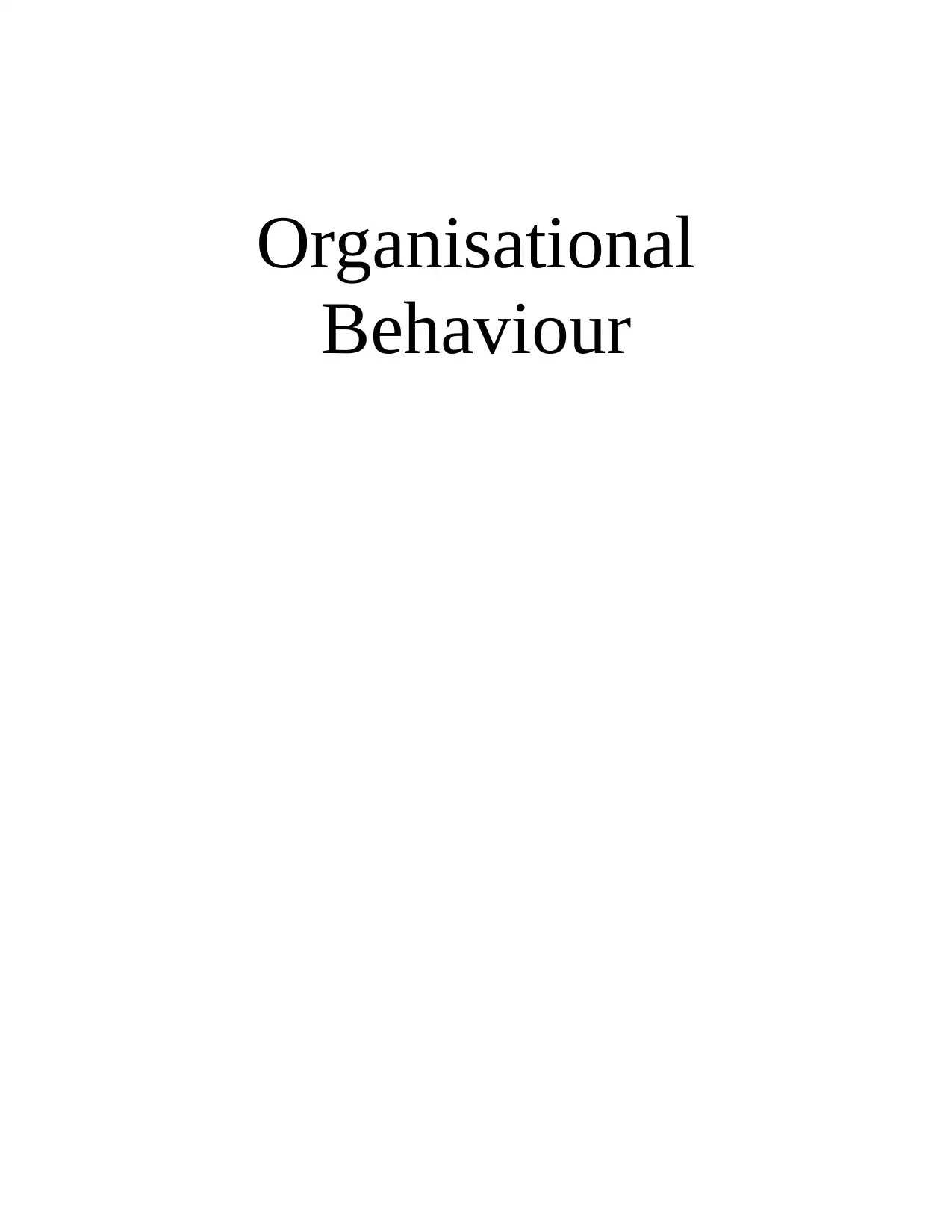
Organisational
Behaviour
Behaviour
Paraphrase This Document
Need a fresh take? Get an instant paraphrase of this document with our AI Paraphraser
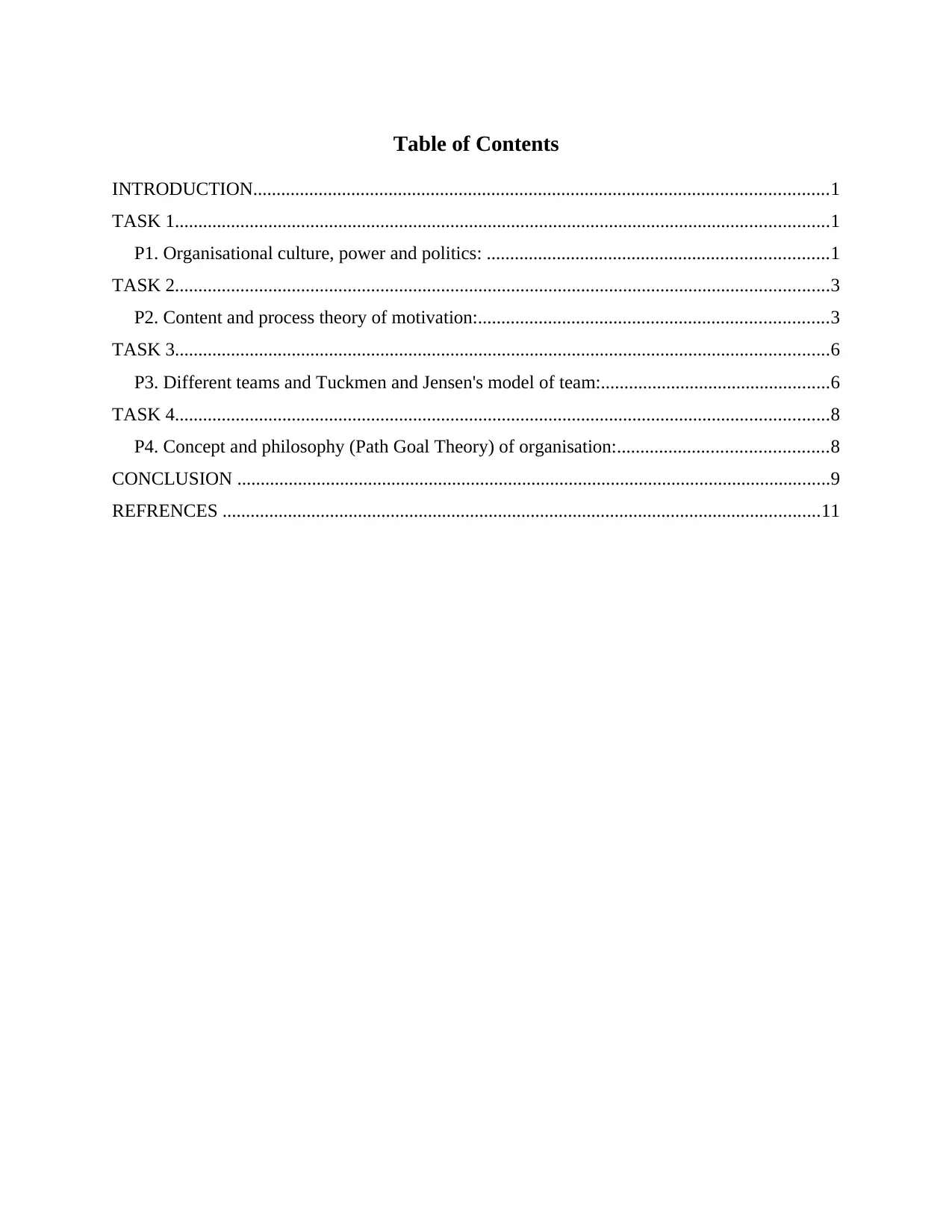
Table of Contents
INTRODUCTION...........................................................................................................................1
TASK 1............................................................................................................................................1
P1. Organisational culture, power and politics: .........................................................................1
TASK 2............................................................................................................................................3
P2. Content and process theory of motivation:...........................................................................3
TASK 3............................................................................................................................................6
P3. Different teams and Tuckmen and Jensen's model of team:.................................................6
TASK 4............................................................................................................................................8
P4. Concept and philosophy (Path Goal Theory) of organisation:.............................................8
CONCLUSION ...............................................................................................................................9
REFRENCES ................................................................................................................................11
INTRODUCTION...........................................................................................................................1
TASK 1............................................................................................................................................1
P1. Organisational culture, power and politics: .........................................................................1
TASK 2............................................................................................................................................3
P2. Content and process theory of motivation:...........................................................................3
TASK 3............................................................................................................................................6
P3. Different teams and Tuckmen and Jensen's model of team:.................................................6
TASK 4............................................................................................................................................8
P4. Concept and philosophy (Path Goal Theory) of organisation:.............................................8
CONCLUSION ...............................................................................................................................9
REFRENCES ................................................................................................................................11

⊘ This is a preview!⊘
Do you want full access?
Subscribe today to unlock all pages.

Trusted by 1+ million students worldwide
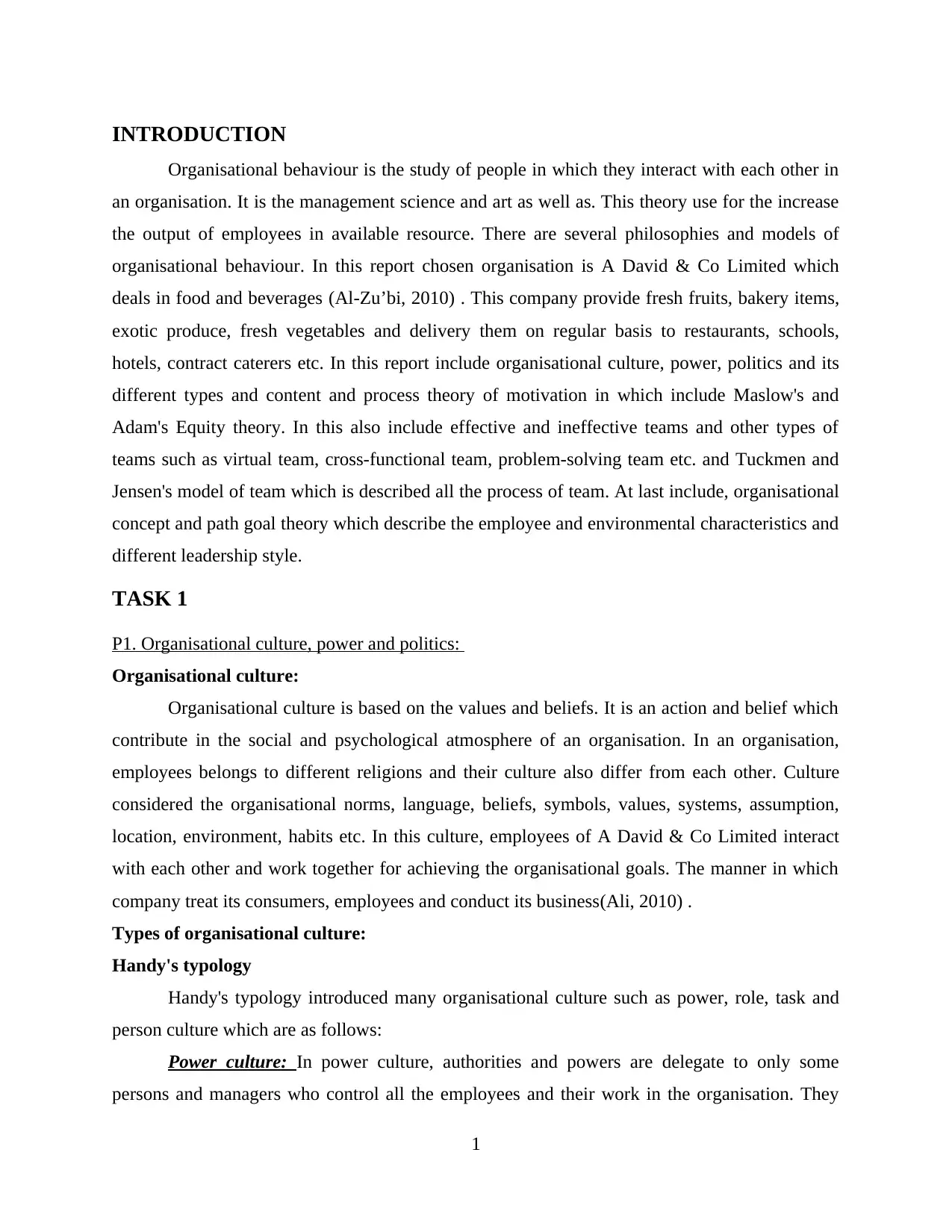
INTRODUCTION
Organisational behaviour is the study of people in which they interact with each other in
an organisation. It is the management science and art as well as. This theory use for the increase
the output of employees in available resource. There are several philosophies and models of
organisational behaviour. In this report chosen organisation is A David & Co Limited which
deals in food and beverages (Al-Zu’bi, 2010) . This company provide fresh fruits, bakery items,
exotic produce, fresh vegetables and delivery them on regular basis to restaurants, schools,
hotels, contract caterers etc. In this report include organisational culture, power, politics and its
different types and content and process theory of motivation in which include Maslow's and
Adam's Equity theory. In this also include effective and ineffective teams and other types of
teams such as virtual team, cross-functional team, problem-solving team etc. and Tuckmen and
Jensen's model of team which is described all the process of team. At last include, organisational
concept and path goal theory which describe the employee and environmental characteristics and
different leadership style.
TASK 1
P1. Organisational culture, power and politics:
Organisational culture:
Organisational culture is based on the values and beliefs. It is an action and belief which
contribute in the social and psychological atmosphere of an organisation. In an organisation,
employees belongs to different religions and their culture also differ from each other. Culture
considered the organisational norms, language, beliefs, symbols, values, systems, assumption,
location, environment, habits etc. In this culture, employees of A David & Co Limited interact
with each other and work together for achieving the organisational goals. The manner in which
company treat its consumers, employees and conduct its business(Ali, 2010) .
Types of organisational culture:
Handy's typology
Handy's typology introduced many organisational culture such as power, role, task and
person culture which are as follows:
Power culture: In power culture, authorities and powers are delegate to only some
persons and managers who control all the employees and their work in the organisation. They
1
Organisational behaviour is the study of people in which they interact with each other in
an organisation. It is the management science and art as well as. This theory use for the increase
the output of employees in available resource. There are several philosophies and models of
organisational behaviour. In this report chosen organisation is A David & Co Limited which
deals in food and beverages (Al-Zu’bi, 2010) . This company provide fresh fruits, bakery items,
exotic produce, fresh vegetables and delivery them on regular basis to restaurants, schools,
hotels, contract caterers etc. In this report include organisational culture, power, politics and its
different types and content and process theory of motivation in which include Maslow's and
Adam's Equity theory. In this also include effective and ineffective teams and other types of
teams such as virtual team, cross-functional team, problem-solving team etc. and Tuckmen and
Jensen's model of team which is described all the process of team. At last include, organisational
concept and path goal theory which describe the employee and environmental characteristics and
different leadership style.
TASK 1
P1. Organisational culture, power and politics:
Organisational culture:
Organisational culture is based on the values and beliefs. It is an action and belief which
contribute in the social and psychological atmosphere of an organisation. In an organisation,
employees belongs to different religions and their culture also differ from each other. Culture
considered the organisational norms, language, beliefs, symbols, values, systems, assumption,
location, environment, habits etc. In this culture, employees of A David & Co Limited interact
with each other and work together for achieving the organisational goals. The manner in which
company treat its consumers, employees and conduct its business(Ali, 2010) .
Types of organisational culture:
Handy's typology
Handy's typology introduced many organisational culture such as power, role, task and
person culture which are as follows:
Power culture: In power culture, authorities and powers are delegate to only some
persons and managers who control all the employees and their work in the organisation. They
1
Paraphrase This Document
Need a fresh take? Get an instant paraphrase of this document with our AI Paraphraser
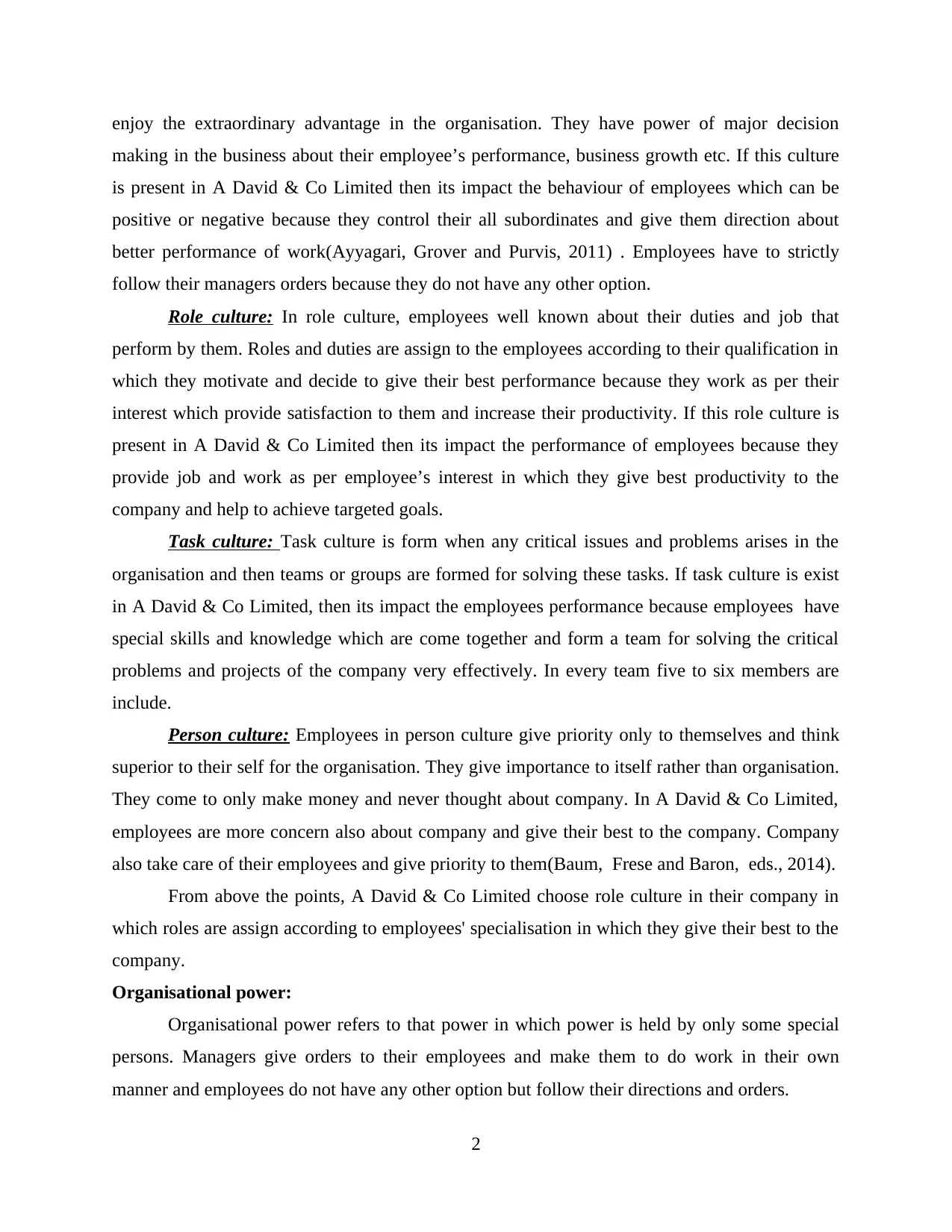
enjoy the extraordinary advantage in the organisation. They have power of major decision
making in the business about their employee’s performance, business growth etc. If this culture
is present in A David & Co Limited then its impact the behaviour of employees which can be
positive or negative because they control their all subordinates and give them direction about
better performance of work(Ayyagari, Grover and Purvis, 2011) . Employees have to strictly
follow their managers orders because they do not have any other option.
Role culture: In role culture, employees well known about their duties and job that
perform by them. Roles and duties are assign to the employees according to their qualification in
which they motivate and decide to give their best performance because they work as per their
interest which provide satisfaction to them and increase their productivity. If this role culture is
present in A David & Co Limited then its impact the performance of employees because they
provide job and work as per employee’s interest in which they give best productivity to the
company and help to achieve targeted goals.
Task culture: Task culture is form when any critical issues and problems arises in the
organisation and then teams or groups are formed for solving these tasks. If task culture is exist
in A David & Co Limited, then its impact the employees performance because employees have
special skills and knowledge which are come together and form a team for solving the critical
problems and projects of the company very effectively. In every team five to six members are
include.
Person culture: Employees in person culture give priority only to themselves and think
superior to their self for the organisation. They give importance to itself rather than organisation.
They come to only make money and never thought about company. In A David & Co Limited,
employees are more concern also about company and give their best to the company. Company
also take care of their employees and give priority to them(Baum, Frese and Baron, eds., 2014).
From above the points, A David & Co Limited choose role culture in their company in
which roles are assign according to employees' specialisation in which they give their best to the
company.
Organisational power:
Organisational power refers to that power in which power is held by only some special
persons. Managers give orders to their employees and make them to do work in their own
manner and employees do not have any other option but follow their directions and orders.
2
making in the business about their employee’s performance, business growth etc. If this culture
is present in A David & Co Limited then its impact the behaviour of employees which can be
positive or negative because they control their all subordinates and give them direction about
better performance of work(Ayyagari, Grover and Purvis, 2011) . Employees have to strictly
follow their managers orders because they do not have any other option.
Role culture: In role culture, employees well known about their duties and job that
perform by them. Roles and duties are assign to the employees according to their qualification in
which they motivate and decide to give their best performance because they work as per their
interest which provide satisfaction to them and increase their productivity. If this role culture is
present in A David & Co Limited then its impact the performance of employees because they
provide job and work as per employee’s interest in which they give best productivity to the
company and help to achieve targeted goals.
Task culture: Task culture is form when any critical issues and problems arises in the
organisation and then teams or groups are formed for solving these tasks. If task culture is exist
in A David & Co Limited, then its impact the employees performance because employees have
special skills and knowledge which are come together and form a team for solving the critical
problems and projects of the company very effectively. In every team five to six members are
include.
Person culture: Employees in person culture give priority only to themselves and think
superior to their self for the organisation. They give importance to itself rather than organisation.
They come to only make money and never thought about company. In A David & Co Limited,
employees are more concern also about company and give their best to the company. Company
also take care of their employees and give priority to them(Baum, Frese and Baron, eds., 2014).
From above the points, A David & Co Limited choose role culture in their company in
which roles are assign according to employees' specialisation in which they give their best to the
company.
Organisational power:
Organisational power refers to that power in which power is held by only some special
persons. Managers give orders to their employees and make them to do work in their own
manner and employees do not have any other option but follow their directions and orders.
2
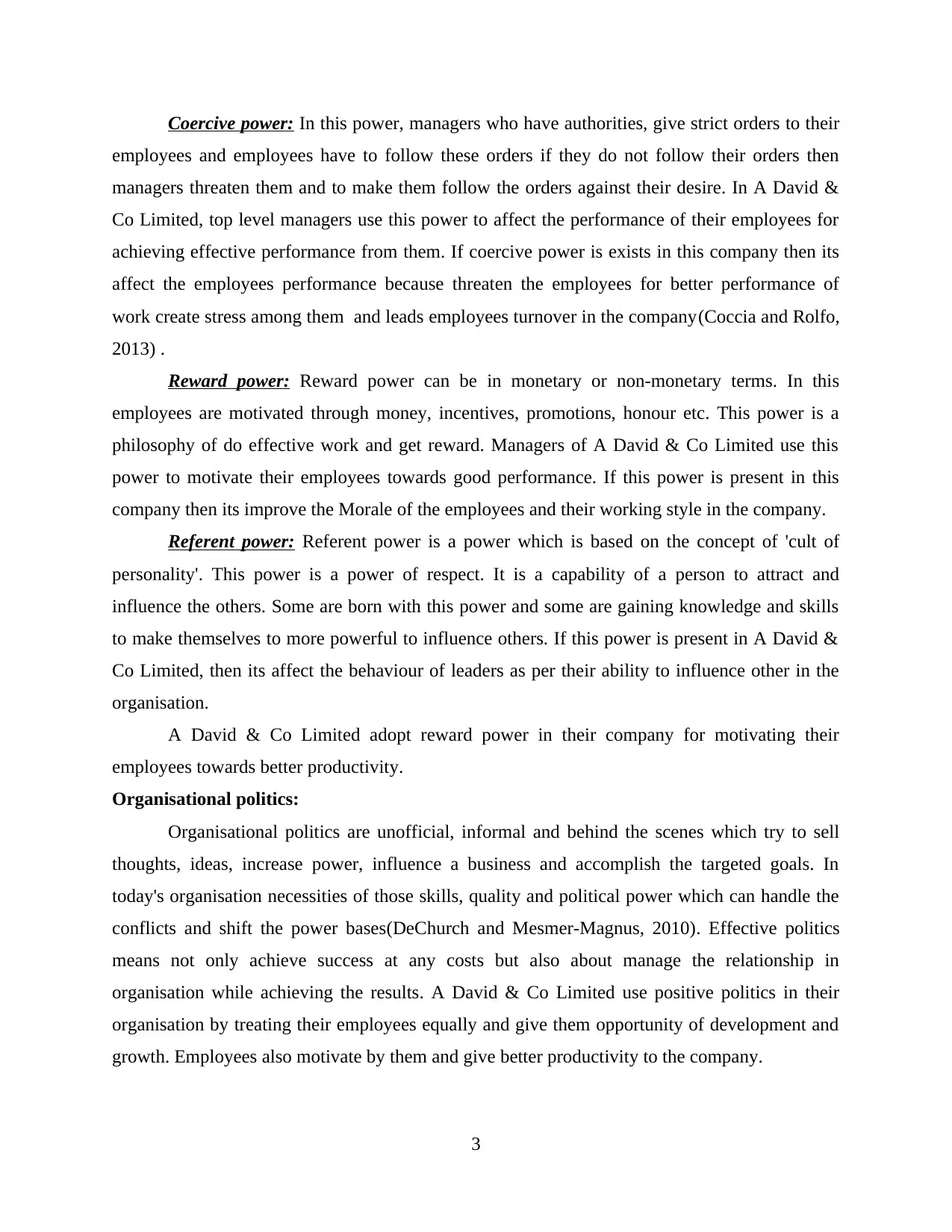
Coercive power: In this power, managers who have authorities, give strict orders to their
employees and employees have to follow these orders if they do not follow their orders then
managers threaten them and to make them follow the orders against their desire. In A David &
Co Limited, top level managers use this power to affect the performance of their employees for
achieving effective performance from them. If coercive power is exists in this company then its
affect the employees performance because threaten the employees for better performance of
work create stress among them and leads employees turnover in the company(Coccia and Rolfo,
2013) .
Reward power: Reward power can be in monetary or non-monetary terms. In this
employees are motivated through money, incentives, promotions, honour etc. This power is a
philosophy of do effective work and get reward. Managers of A David & Co Limited use this
power to motivate their employees towards good performance. If this power is present in this
company then its improve the Morale of the employees and their working style in the company.
Referent power: Referent power is a power which is based on the concept of 'cult of
personality'. This power is a power of respect. It is a capability of a person to attract and
influence the others. Some are born with this power and some are gaining knowledge and skills
to make themselves to more powerful to influence others. If this power is present in A David &
Co Limited, then its affect the behaviour of leaders as per their ability to influence other in the
organisation.
A David & Co Limited adopt reward power in their company for motivating their
employees towards better productivity.
Organisational politics:
Organisational politics are unofficial, informal and behind the scenes which try to sell
thoughts, ideas, increase power, influence a business and accomplish the targeted goals. In
today's organisation necessities of those skills, quality and political power which can handle the
conflicts and shift the power bases(DeChurch and Mesmer-Magnus, 2010). Effective politics
means not only achieve success at any costs but also about manage the relationship in
organisation while achieving the results. A David & Co Limited use positive politics in their
organisation by treating their employees equally and give them opportunity of development and
growth. Employees also motivate by them and give better productivity to the company.
3
employees and employees have to follow these orders if they do not follow their orders then
managers threaten them and to make them follow the orders against their desire. In A David &
Co Limited, top level managers use this power to affect the performance of their employees for
achieving effective performance from them. If coercive power is exists in this company then its
affect the employees performance because threaten the employees for better performance of
work create stress among them and leads employees turnover in the company(Coccia and Rolfo,
2013) .
Reward power: Reward power can be in monetary or non-monetary terms. In this
employees are motivated through money, incentives, promotions, honour etc. This power is a
philosophy of do effective work and get reward. Managers of A David & Co Limited use this
power to motivate their employees towards good performance. If this power is present in this
company then its improve the Morale of the employees and their working style in the company.
Referent power: Referent power is a power which is based on the concept of 'cult of
personality'. This power is a power of respect. It is a capability of a person to attract and
influence the others. Some are born with this power and some are gaining knowledge and skills
to make themselves to more powerful to influence others. If this power is present in A David &
Co Limited, then its affect the behaviour of leaders as per their ability to influence other in the
organisation.
A David & Co Limited adopt reward power in their company for motivating their
employees towards better productivity.
Organisational politics:
Organisational politics are unofficial, informal and behind the scenes which try to sell
thoughts, ideas, increase power, influence a business and accomplish the targeted goals. In
today's organisation necessities of those skills, quality and political power which can handle the
conflicts and shift the power bases(DeChurch and Mesmer-Magnus, 2010). Effective politics
means not only achieve success at any costs but also about manage the relationship in
organisation while achieving the results. A David & Co Limited use positive politics in their
organisation by treating their employees equally and give them opportunity of development and
growth. Employees also motivate by them and give better productivity to the company.
3
⊘ This is a preview!⊘
Do you want full access?
Subscribe today to unlock all pages.

Trusted by 1+ million students worldwide
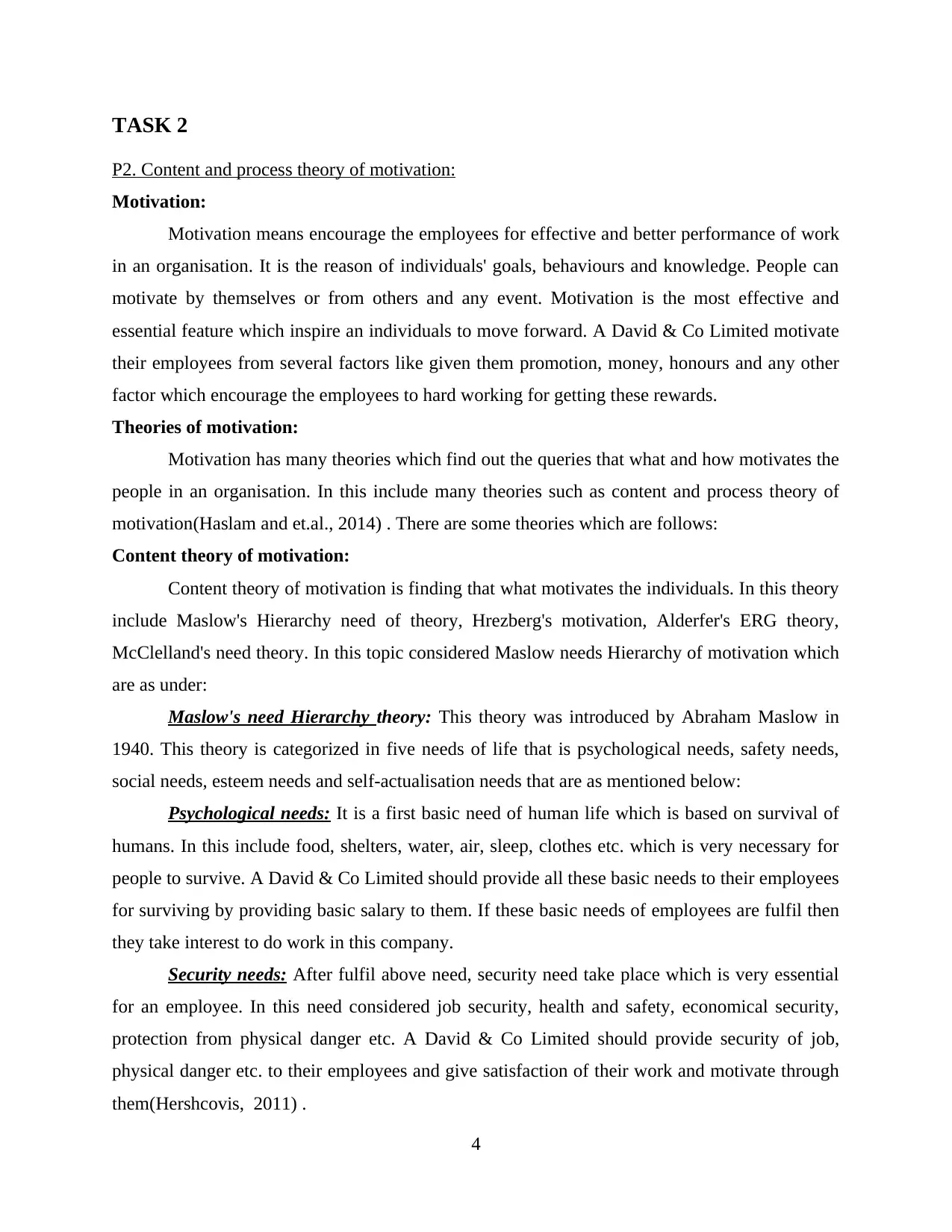
TASK 2
P2. Content and process theory of motivation:
Motivation:
Motivation means encourage the employees for effective and better performance of work
in an organisation. It is the reason of individuals' goals, behaviours and knowledge. People can
motivate by themselves or from others and any event. Motivation is the most effective and
essential feature which inspire an individuals to move forward. A David & Co Limited motivate
their employees from several factors like given them promotion, money, honours and any other
factor which encourage the employees to hard working for getting these rewards.
Theories of motivation:
Motivation has many theories which find out the queries that what and how motivates the
people in an organisation. In this include many theories such as content and process theory of
motivation(Haslam and et.al., 2014) . There are some theories which are follows:
Content theory of motivation:
Content theory of motivation is finding that what motivates the individuals. In this theory
include Maslow's Hierarchy need of theory, Hrezberg's motivation, Alderfer's ERG theory,
McClelland's need theory. In this topic considered Maslow needs Hierarchy of motivation which
are as under:
Maslow's need Hierarchy theory: This theory was introduced by Abraham Maslow in
1940. This theory is categorized in five needs of life that is psychological needs, safety needs,
social needs, esteem needs and self-actualisation needs that are as mentioned below:
Psychological needs: It is a first basic need of human life which is based on survival of
humans. In this include food, shelters, water, air, sleep, clothes etc. which is very necessary for
people to survive. A David & Co Limited should provide all these basic needs to their employees
for surviving by providing basic salary to them. If these basic needs of employees are fulfil then
they take interest to do work in this company.
Security needs: After fulfil above need, security need take place which is very essential
for an employee. In this need considered job security, health and safety, economical security,
protection from physical danger etc. A David & Co Limited should provide security of job,
physical danger etc. to their employees and give satisfaction of their work and motivate through
them(Hershcovis, 2011) .
4
P2. Content and process theory of motivation:
Motivation:
Motivation means encourage the employees for effective and better performance of work
in an organisation. It is the reason of individuals' goals, behaviours and knowledge. People can
motivate by themselves or from others and any event. Motivation is the most effective and
essential feature which inspire an individuals to move forward. A David & Co Limited motivate
their employees from several factors like given them promotion, money, honours and any other
factor which encourage the employees to hard working for getting these rewards.
Theories of motivation:
Motivation has many theories which find out the queries that what and how motivates the
people in an organisation. In this include many theories such as content and process theory of
motivation(Haslam and et.al., 2014) . There are some theories which are follows:
Content theory of motivation:
Content theory of motivation is finding that what motivates the individuals. In this theory
include Maslow's Hierarchy need of theory, Hrezberg's motivation, Alderfer's ERG theory,
McClelland's need theory. In this topic considered Maslow needs Hierarchy of motivation which
are as under:
Maslow's need Hierarchy theory: This theory was introduced by Abraham Maslow in
1940. This theory is categorized in five needs of life that is psychological needs, safety needs,
social needs, esteem needs and self-actualisation needs that are as mentioned below:
Psychological needs: It is a first basic need of human life which is based on survival of
humans. In this include food, shelters, water, air, sleep, clothes etc. which is very necessary for
people to survive. A David & Co Limited should provide all these basic needs to their employees
for surviving by providing basic salary to them. If these basic needs of employees are fulfil then
they take interest to do work in this company.
Security needs: After fulfil above need, security need take place which is very essential
for an employee. In this need considered job security, health and safety, economical security,
protection from physical danger etc. A David & Co Limited should provide security of job,
physical danger etc. to their employees and give satisfaction of their work and motivate through
them(Hershcovis, 2011) .
4
Paraphrase This Document
Need a fresh take? Get an instant paraphrase of this document with our AI Paraphraser
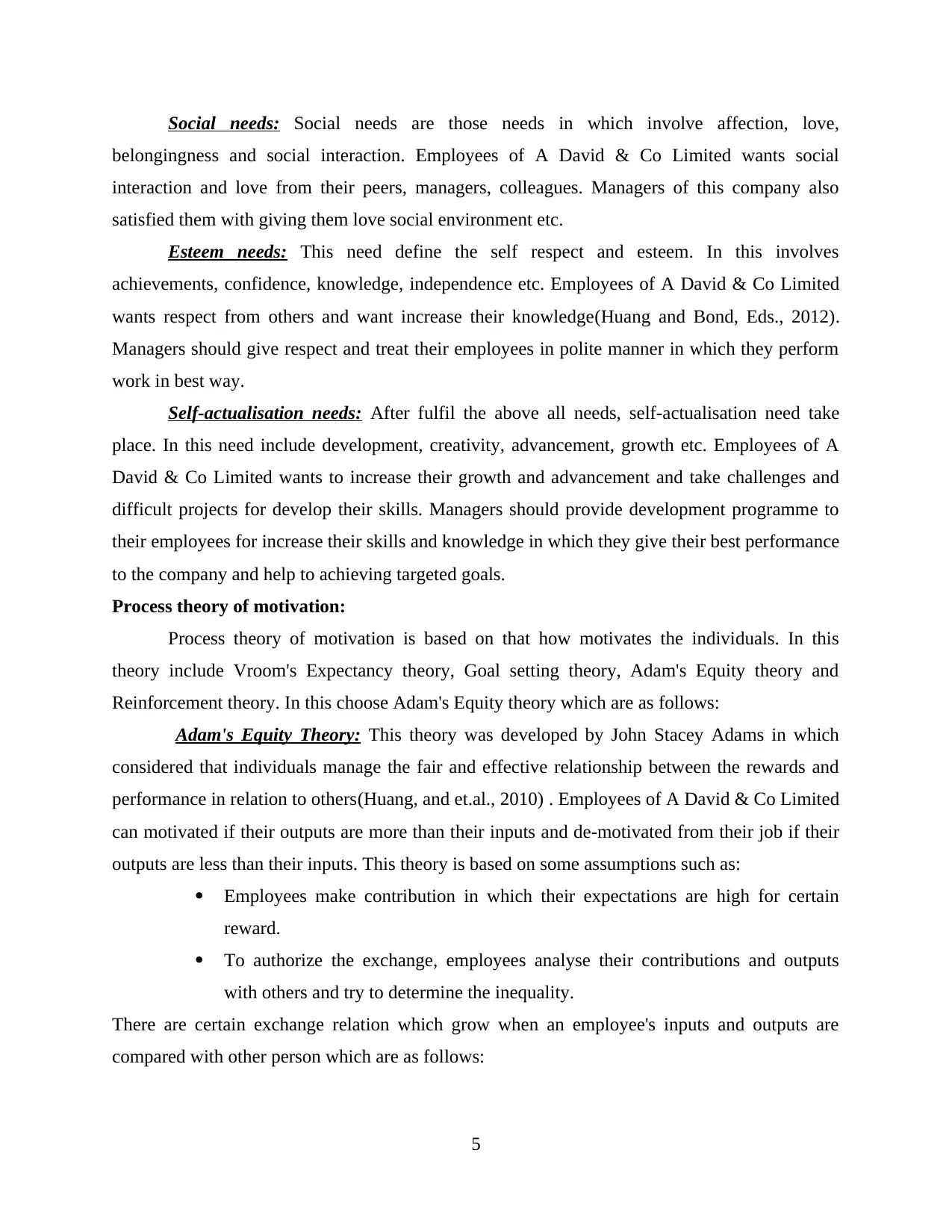
Social needs: Social needs are those needs in which involve affection, love,
belongingness and social interaction. Employees of A David & Co Limited wants social
interaction and love from their peers, managers, colleagues. Managers of this company also
satisfied them with giving them love social environment etc.
Esteem needs: This need define the self respect and esteem. In this involves
achievements, confidence, knowledge, independence etc. Employees of A David & Co Limited
wants respect from others and want increase their knowledge(Huang and Bond, Eds., 2012).
Managers should give respect and treat their employees in polite manner in which they perform
work in best way.
Self-actualisation needs: After fulfil the above all needs, self-actualisation need take
place. In this need include development, creativity, advancement, growth etc. Employees of A
David & Co Limited wants to increase their growth and advancement and take challenges and
difficult projects for develop their skills. Managers should provide development programme to
their employees for increase their skills and knowledge in which they give their best performance
to the company and help to achieving targeted goals.
Process theory of motivation:
Process theory of motivation is based on that how motivates the individuals. In this
theory include Vroom's Expectancy theory, Goal setting theory, Adam's Equity theory and
Reinforcement theory. In this choose Adam's Equity theory which are as follows:
Adam's Equity Theory: This theory was developed by John Stacey Adams in which
considered that individuals manage the fair and effective relationship between the rewards and
performance in relation to others(Huang, and et.al., 2010) . Employees of A David & Co Limited
can motivated if their outputs are more than their inputs and de-motivated from their job if their
outputs are less than their inputs. This theory is based on some assumptions such as:
Employees make contribution in which their expectations are high for certain
reward.
To authorize the exchange, employees analyse their contributions and outputs
with others and try to determine the inequality.
There are certain exchange relation which grow when an employee's inputs and outputs are
compared with other person which are as follows:
5
belongingness and social interaction. Employees of A David & Co Limited wants social
interaction and love from their peers, managers, colleagues. Managers of this company also
satisfied them with giving them love social environment etc.
Esteem needs: This need define the self respect and esteem. In this involves
achievements, confidence, knowledge, independence etc. Employees of A David & Co Limited
wants respect from others and want increase their knowledge(Huang and Bond, Eds., 2012).
Managers should give respect and treat their employees in polite manner in which they perform
work in best way.
Self-actualisation needs: After fulfil the above all needs, self-actualisation need take
place. In this need include development, creativity, advancement, growth etc. Employees of A
David & Co Limited wants to increase their growth and advancement and take challenges and
difficult projects for develop their skills. Managers should provide development programme to
their employees for increase their skills and knowledge in which they give their best performance
to the company and help to achieving targeted goals.
Process theory of motivation:
Process theory of motivation is based on that how motivates the individuals. In this
theory include Vroom's Expectancy theory, Goal setting theory, Adam's Equity theory and
Reinforcement theory. In this choose Adam's Equity theory which are as follows:
Adam's Equity Theory: This theory was developed by John Stacey Adams in which
considered that individuals manage the fair and effective relationship between the rewards and
performance in relation to others(Huang, and et.al., 2010) . Employees of A David & Co Limited
can motivated if their outputs are more than their inputs and de-motivated from their job if their
outputs are less than their inputs. This theory is based on some assumptions such as:
Employees make contribution in which their expectations are high for certain
reward.
To authorize the exchange, employees analyse their contributions and outputs
with others and try to determine the inequality.
There are certain exchange relation which grow when an employee's inputs and outputs are
compared with other person which are as follows:
5
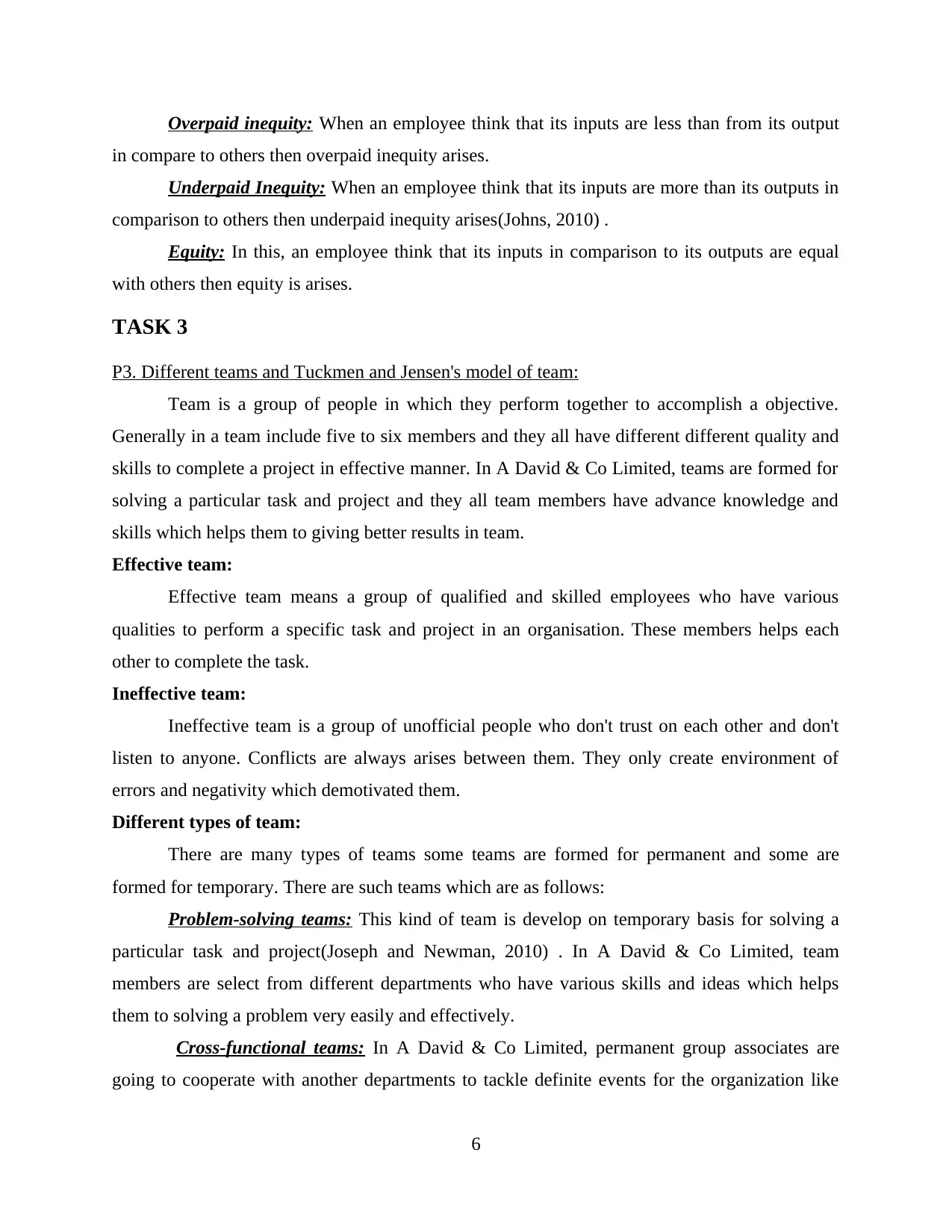
Overpaid inequity: When an employee think that its inputs are less than from its output
in compare to others then overpaid inequity arises.
Underpaid Inequity: When an employee think that its inputs are more than its outputs in
comparison to others then underpaid inequity arises(Johns, 2010) .
Equity: In this, an employee think that its inputs in comparison to its outputs are equal
with others then equity is arises.
TASK 3
P3. Different teams and Tuckmen and Jensen's model of team:
Team is a group of people in which they perform together to accomplish a objective.
Generally in a team include five to six members and they all have different different quality and
skills to complete a project in effective manner. In A David & Co Limited, teams are formed for
solving a particular task and project and they all team members have advance knowledge and
skills which helps them to giving better results in team.
Effective team:
Effective team means a group of qualified and skilled employees who have various
qualities to perform a specific task and project in an organisation. These members helps each
other to complete the task.
Ineffective team:
Ineffective team is a group of unofficial people who don't trust on each other and don't
listen to anyone. Conflicts are always arises between them. They only create environment of
errors and negativity which demotivated them.
Different types of team:
There are many types of teams some teams are formed for permanent and some are
formed for temporary. There are such teams which are as follows:
Problem-solving teams: This kind of team is develop on temporary basis for solving a
particular task and project(Joseph and Newman, 2010) . In A David & Co Limited, team
members are select from different departments who have various skills and ideas which helps
them to solving a problem very easily and effectively.
Cross-functional teams: In A David & Co Limited, permanent group associates are
going to cooperate with another departments to tackle definite events for the organization like
6
in compare to others then overpaid inequity arises.
Underpaid Inequity: When an employee think that its inputs are more than its outputs in
comparison to others then underpaid inequity arises(Johns, 2010) .
Equity: In this, an employee think that its inputs in comparison to its outputs are equal
with others then equity is arises.
TASK 3
P3. Different teams and Tuckmen and Jensen's model of team:
Team is a group of people in which they perform together to accomplish a objective.
Generally in a team include five to six members and they all have different different quality and
skills to complete a project in effective manner. In A David & Co Limited, teams are formed for
solving a particular task and project and they all team members have advance knowledge and
skills which helps them to giving better results in team.
Effective team:
Effective team means a group of qualified and skilled employees who have various
qualities to perform a specific task and project in an organisation. These members helps each
other to complete the task.
Ineffective team:
Ineffective team is a group of unofficial people who don't trust on each other and don't
listen to anyone. Conflicts are always arises between them. They only create environment of
errors and negativity which demotivated them.
Different types of team:
There are many types of teams some teams are formed for permanent and some are
formed for temporary. There are such teams which are as follows:
Problem-solving teams: This kind of team is develop on temporary basis for solving a
particular task and project(Joseph and Newman, 2010) . In A David & Co Limited, team
members are select from different departments who have various skills and ideas which helps
them to solving a problem very easily and effectively.
Cross-functional teams: In A David & Co Limited, permanent group associates are
going to cooperate with another departments to tackle definite events for the organization like
6
⊘ This is a preview!⊘
Do you want full access?
Subscribe today to unlock all pages.

Trusted by 1+ million students worldwide
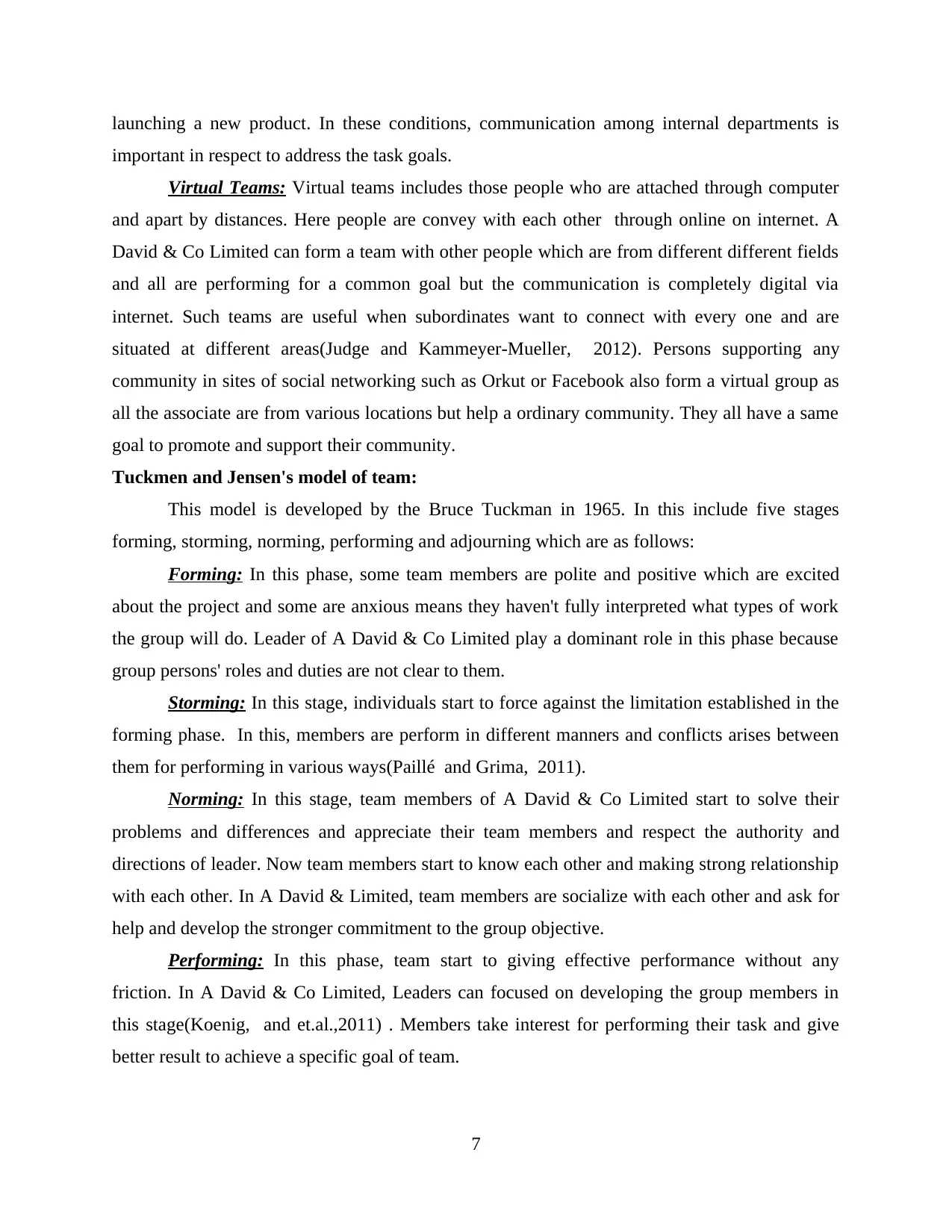
launching a new product. In these conditions, communication among internal departments is
important in respect to address the task goals.
Virtual Teams: Virtual teams includes those people who are attached through computer
and apart by distances. Here people are convey with each other through online on internet. A
David & Co Limited can form a team with other people which are from different different fields
and all are performing for a common goal but the communication is completely digital via
internet. Such teams are useful when subordinates want to connect with every one and are
situated at different areas(Judge and Kammeyer‐Mueller, 2012). Persons supporting any
community in sites of social networking such as Orkut or Facebook also form a virtual group as
all the associate are from various locations but help a ordinary community. They all have a same
goal to promote and support their community.
Tuckmen and Jensen's model of team:
This model is developed by the Bruce Tuckman in 1965. In this include five stages
forming, storming, norming, performing and adjourning which are as follows:
Forming: In this phase, some team members are polite and positive which are excited
about the project and some are anxious means they haven't fully interpreted what types of work
the group will do. Leader of A David & Co Limited play a dominant role in this phase because
group persons' roles and duties are not clear to them.
Storming: In this stage, individuals start to force against the limitation established in the
forming phase. In this, members are perform in different manners and conflicts arises between
them for performing in various ways(Paillé and Grima, 2011).
Norming: In this stage, team members of A David & Co Limited start to solve their
problems and differences and appreciate their team members and respect the authority and
directions of leader. Now team members start to know each other and making strong relationship
with each other. In A David & Limited, team members are socialize with each other and ask for
help and develop the stronger commitment to the group objective.
Performing: In this phase, team start to giving effective performance without any
friction. In A David & Co Limited, Leaders can focused on developing the group members in
this stage(Koenig, and et.al.,2011) . Members take interest for performing their task and give
better result to achieve a specific goal of team.
7
important in respect to address the task goals.
Virtual Teams: Virtual teams includes those people who are attached through computer
and apart by distances. Here people are convey with each other through online on internet. A
David & Co Limited can form a team with other people which are from different different fields
and all are performing for a common goal but the communication is completely digital via
internet. Such teams are useful when subordinates want to connect with every one and are
situated at different areas(Judge and Kammeyer‐Mueller, 2012). Persons supporting any
community in sites of social networking such as Orkut or Facebook also form a virtual group as
all the associate are from various locations but help a ordinary community. They all have a same
goal to promote and support their community.
Tuckmen and Jensen's model of team:
This model is developed by the Bruce Tuckman in 1965. In this include five stages
forming, storming, norming, performing and adjourning which are as follows:
Forming: In this phase, some team members are polite and positive which are excited
about the project and some are anxious means they haven't fully interpreted what types of work
the group will do. Leader of A David & Co Limited play a dominant role in this phase because
group persons' roles and duties are not clear to them.
Storming: In this stage, individuals start to force against the limitation established in the
forming phase. In this, members are perform in different manners and conflicts arises between
them for performing in various ways(Paillé and Grima, 2011).
Norming: In this stage, team members of A David & Co Limited start to solve their
problems and differences and appreciate their team members and respect the authority and
directions of leader. Now team members start to know each other and making strong relationship
with each other. In A David & Limited, team members are socialize with each other and ask for
help and develop the stronger commitment to the group objective.
Performing: In this phase, team start to giving effective performance without any
friction. In A David & Co Limited, Leaders can focused on developing the group members in
this stage(Koenig, and et.al.,2011) . Members take interest for performing their task and give
better result to achieve a specific goal of team.
7
Paraphrase This Document
Need a fresh take? Get an instant paraphrase of this document with our AI Paraphraser
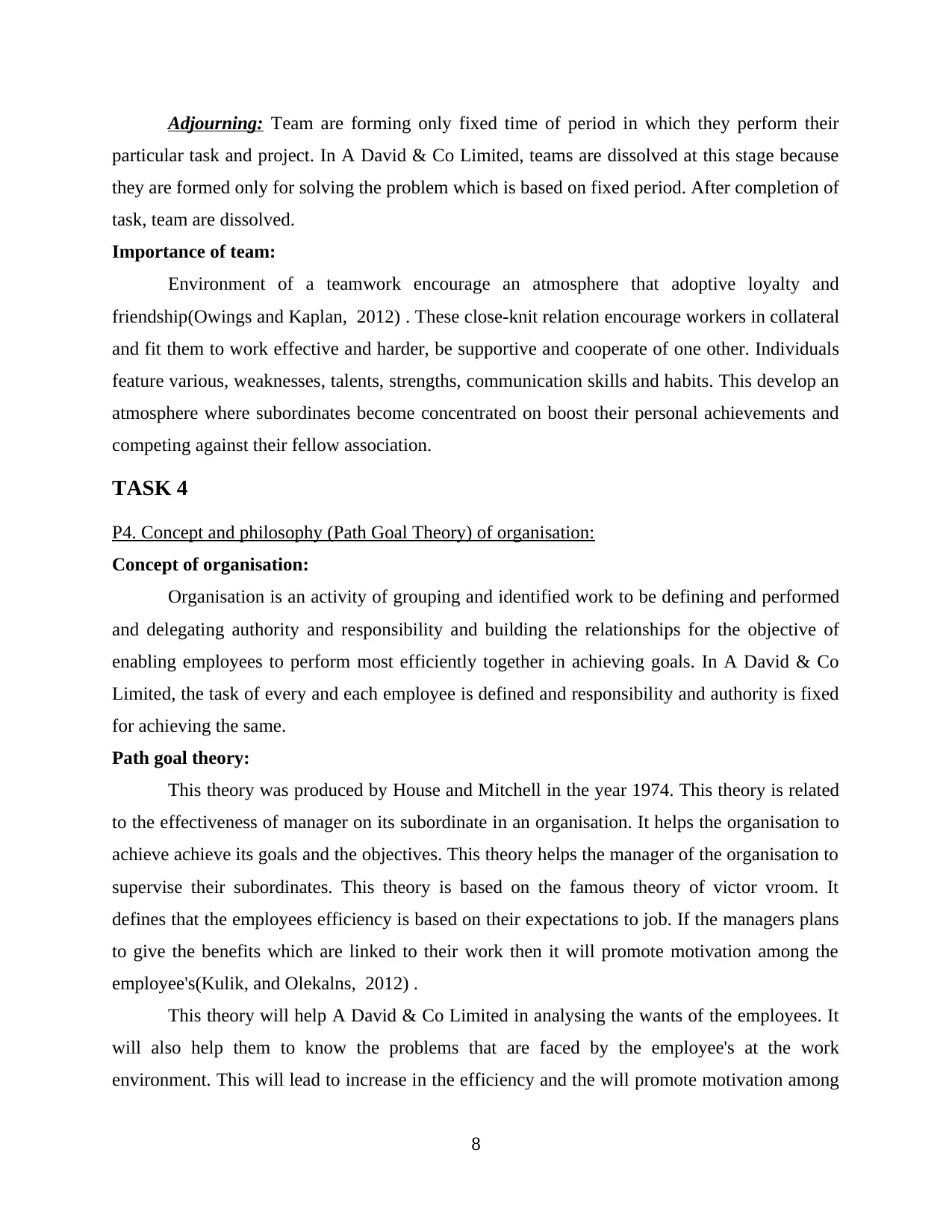
Adjourning: Team are forming only fixed time of period in which they perform their
particular task and project. In A David & Co Limited, teams are dissolved at this stage because
they are formed only for solving the problem which is based on fixed period. After completion of
task, team are dissolved.
Importance of team:
Environment of a teamwork encourage an atmosphere that adoptive loyalty and
friendship(Owings and Kaplan, 2012) . These close-knit relation encourage workers in collateral
and fit them to work effective and harder, be supportive and cooperate of one other. Individuals
feature various, weaknesses, talents, strengths, communication skills and habits. This develop an
atmosphere where subordinates become concentrated on boost their personal achievements and
competing against their fellow association.
TASK 4
P4. Concept and philosophy (Path Goal Theory) of organisation:
Concept of organisation:
Organisation is an activity of grouping and identified work to be defining and performed
and delegating authority and responsibility and building the relationships for the objective of
enabling employees to perform most efficiently together in achieving goals. In A David & Co
Limited, the task of every and each employee is defined and responsibility and authority is fixed
for achieving the same.
Path goal theory:
This theory was produced by House and Mitchell in the year 1974. This theory is related
to the effectiveness of manager on its subordinate in an organisation. It helps the organisation to
achieve achieve its goals and the objectives. This theory helps the manager of the organisation to
supervise their subordinates. This theory is based on the famous theory of victor vroom. It
defines that the employees efficiency is based on their expectations to job. If the managers plans
to give the benefits which are linked to their work then it will promote motivation among the
employee's(Kulik, and Olekalns, 2012) .
This theory will help A David & Co Limited in analysing the wants of the employees. It
will also help them to know the problems that are faced by the employee's at the work
environment. This will lead to increase in the efficiency and the will promote motivation among
8
particular task and project. In A David & Co Limited, teams are dissolved at this stage because
they are formed only for solving the problem which is based on fixed period. After completion of
task, team are dissolved.
Importance of team:
Environment of a teamwork encourage an atmosphere that adoptive loyalty and
friendship(Owings and Kaplan, 2012) . These close-knit relation encourage workers in collateral
and fit them to work effective and harder, be supportive and cooperate of one other. Individuals
feature various, weaknesses, talents, strengths, communication skills and habits. This develop an
atmosphere where subordinates become concentrated on boost their personal achievements and
competing against their fellow association.
TASK 4
P4. Concept and philosophy (Path Goal Theory) of organisation:
Concept of organisation:
Organisation is an activity of grouping and identified work to be defining and performed
and delegating authority and responsibility and building the relationships for the objective of
enabling employees to perform most efficiently together in achieving goals. In A David & Co
Limited, the task of every and each employee is defined and responsibility and authority is fixed
for achieving the same.
Path goal theory:
This theory was produced by House and Mitchell in the year 1974. This theory is related
to the effectiveness of manager on its subordinate in an organisation. It helps the organisation to
achieve achieve its goals and the objectives. This theory helps the manager of the organisation to
supervise their subordinates. This theory is based on the famous theory of victor vroom. It
defines that the employees efficiency is based on their expectations to job. If the managers plans
to give the benefits which are linked to their work then it will promote motivation among the
employee's(Kulik, and Olekalns, 2012) .
This theory will help A David & Co Limited in analysing the wants of the employees. It
will also help them to know the problems that are faced by the employee's at the work
environment. This will lead to increase in the efficiency and the will promote motivation among
8
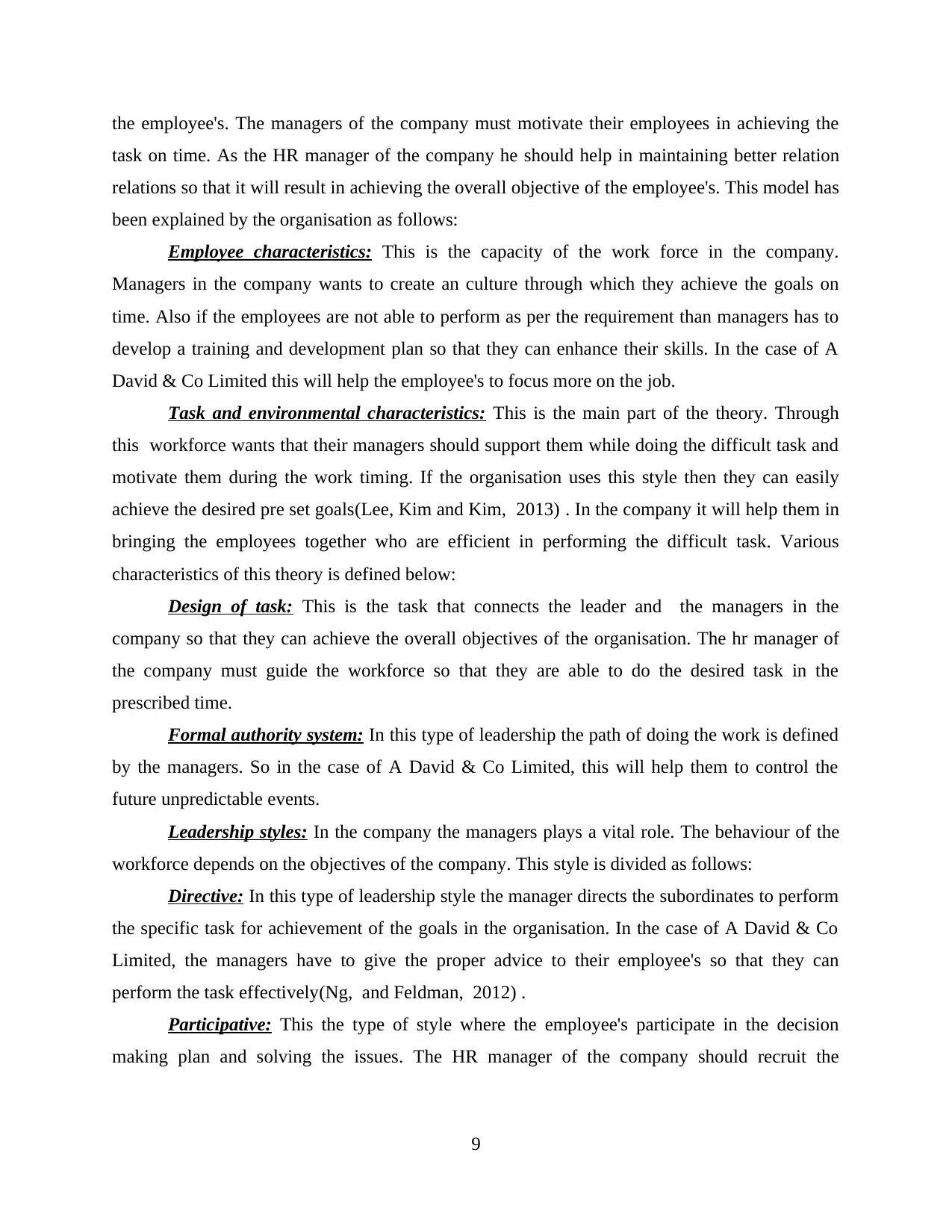
the employee's. The managers of the company must motivate their employees in achieving the
task on time. As the HR manager of the company he should help in maintaining better relation
relations so that it will result in achieving the overall objective of the employee's. This model has
been explained by the organisation as follows:
Employee characteristics: This is the capacity of the work force in the company.
Managers in the company wants to create an culture through which they achieve the goals on
time. Also if the employees are not able to perform as per the requirement than managers has to
develop a training and development plan so that they can enhance their skills. In the case of A
David & Co Limited this will help the employee's to focus more on the job.
Task and environmental characteristics: This is the main part of the theory. Through
this workforce wants that their managers should support them while doing the difficult task and
motivate them during the work timing. If the organisation uses this style then they can easily
achieve the desired pre set goals(Lee, Kim and Kim, 2013) . In the company it will help them in
bringing the employees together who are efficient in performing the difficult task. Various
characteristics of this theory is defined below:
Design of task: This is the task that connects the leader and the managers in the
company so that they can achieve the overall objectives of the organisation. The hr manager of
the company must guide the workforce so that they are able to do the desired task in the
prescribed time.
Formal authority system: In this type of leadership the path of doing the work is defined
by the managers. So in the case of A David & Co Limited, this will help them to control the
future unpredictable events.
Leadership styles: In the company the managers plays a vital role. The behaviour of the
workforce depends on the objectives of the company. This style is divided as follows:
Directive: In this type of leadership style the manager directs the subordinates to perform
the specific task for achievement of the goals in the organisation. In the case of A David & Co
Limited, the managers have to give the proper advice to their employee's so that they can
perform the task effectively(Ng, and Feldman, 2012) .
Participative: This the type of style where the employee's participate in the decision
making plan and solving the issues. The HR manager of the company should recruit the
9
task on time. As the HR manager of the company he should help in maintaining better relation
relations so that it will result in achieving the overall objective of the employee's. This model has
been explained by the organisation as follows:
Employee characteristics: This is the capacity of the work force in the company.
Managers in the company wants to create an culture through which they achieve the goals on
time. Also if the employees are not able to perform as per the requirement than managers has to
develop a training and development plan so that they can enhance their skills. In the case of A
David & Co Limited this will help the employee's to focus more on the job.
Task and environmental characteristics: This is the main part of the theory. Through
this workforce wants that their managers should support them while doing the difficult task and
motivate them during the work timing. If the organisation uses this style then they can easily
achieve the desired pre set goals(Lee, Kim and Kim, 2013) . In the company it will help them in
bringing the employees together who are efficient in performing the difficult task. Various
characteristics of this theory is defined below:
Design of task: This is the task that connects the leader and the managers in the
company so that they can achieve the overall objectives of the organisation. The hr manager of
the company must guide the workforce so that they are able to do the desired task in the
prescribed time.
Formal authority system: In this type of leadership the path of doing the work is defined
by the managers. So in the case of A David & Co Limited, this will help them to control the
future unpredictable events.
Leadership styles: In the company the managers plays a vital role. The behaviour of the
workforce depends on the objectives of the company. This style is divided as follows:
Directive: In this type of leadership style the manager directs the subordinates to perform
the specific task for achievement of the goals in the organisation. In the case of A David & Co
Limited, the managers have to give the proper advice to their employee's so that they can
perform the task effectively(Ng, and Feldman, 2012) .
Participative: This the type of style where the employee's participate in the decision
making plan and solving the issues. The HR manager of the company should recruit the
9
⊘ This is a preview!⊘
Do you want full access?
Subscribe today to unlock all pages.

Trusted by 1+ million students worldwide
1 out of 15
Related Documents
Your All-in-One AI-Powered Toolkit for Academic Success.
+13062052269
info@desklib.com
Available 24*7 on WhatsApp / Email
![[object Object]](/_next/static/media/star-bottom.7253800d.svg)
Unlock your academic potential
Copyright © 2020–2026 A2Z Services. All Rights Reserved. Developed and managed by ZUCOL.





